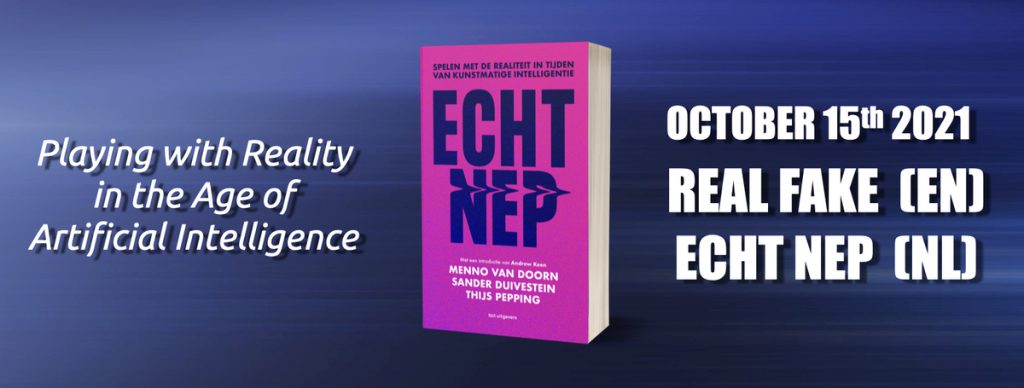
It’s official: the full title of our upcoming book is “Real Fake – Playing with Reality in the Age of Artificial Intelligence”.
“Real Fake” is our take on synthetic media and the follow-up to our 2008 book “Me the Media”. Real Fake is about how humans continuously manipulate reality and how new digital technology tools enable us to go one step further in this ancient game. This includes modern phenomena like conspiracy theories such as QAnon, Deepfakes, and fake news, but also virtual humans such as CGI Influencer Lil Miquela and virtual worlds like Fortnite.
Infinity Revenue, Infinity Possibilities

“When we look back in a decade or two, my bet is that this period in Axie’s life is just the start of something huge, a small blip on a much bigger graph, both in terms of revenue and impact. In the mid-case, it’s a player-owned, Pokémon-sized juggernaut and an example of the benefits of vertical integration. In the bull case, it’s a new nation, based in the Metaverse, that improves the lives of millions of people around the world.”
In April, Axie did about $670k in revenue.
In May, it did $3.0 million.
In June, $12.2 million.
In July it closes at $153 million.
Total revenue projected by the end of dec $1.1 billion. If it all works as planned. Not bad for a cute little game.
From playing a game to the game of life

Protein folding explained
Join DeepMind Science Engineer Kathryn Tunyasuvunakool to explore the hidden world of proteins .These tiny molecular machines underpin every biological process…
Google DeepMind has done something far more relevant than playing a game of “Go”. It’s CEO and co-founder Demis Hassabis said at a press briefing that he believes that “the most significant contribution AI has made to advancing the status of scientific knowledge to date” is their recent release of the predicted structure of 350.000 proteins. These structures, discovered by Deepmind’s AI system AlphaFold, contain key insights for drug discovery for diseases like Alzheimer, cancer and so on. They are planning to release 100 million of those structures the coming months. AlphaFold’s lead researcher (who is quoted in this Wired article that you should read) says “We’re rubbish at predicting protein structures,”. Marrying machine learning and biology doesn’t just mean doing something better, it means doing something that humans can’t do at all. Life sciences without AI would be a dead end street.
Study shows: Covid attacks intelligence
“We’re rubbish in predicting protein structures” we just read in the article above. And it won’t get any better. In PsyPost we read about a study published in The Lancet: “People who have recovered from COVID-19 tend to score significantly lower on an intelligence test compared to those who have not contracted the virus, according to new research published in The Lancet journal EClinicalMedicine. The findings suggest that the SARS-CoV-2 virus that causes COVID-19 can produce substantial reductions in cognitive ability, especially among those with more severe illness.” Do we need more AI now that research shows that COVID lowers human intelligence significantly?
The TikTokification of IP

We need to rethink IP on the internet. In a nice longread by Tal Shachar, CDO of esports and gaming company IGC and former BuzzFeed exec, there’s a lot of speculation on how this will evolve. “But here’s what we do know. IP is moving from one way to two way creation and consumption. Technology is making every content format developable and by making a genre “developable”, it supercharges the two way IP model […] In many respects, TikTok is the inevitable and natural conclusion of the memfication and socialization of content. If the medium is the message, then IP is the ink with which it’s written. Users react, recreate, remix and redefine any and all IP in a massive algorithmically driven social experiment designed to take existing ideas, content, and formats, mash them together perhaps with a bit of something new, throw them at the wall, and see what sticks, only to scrape up what does and start the whole process over again. […] The catalyst for an industry to move from one-way to two-way IP relationships is the emergence of tooling that lowers the barrier of entry to engage with the IP itself. Like the shift from newspapers to social networks, today’s IP is evolving from community engagement and consumption to community creation and development.
China’s digital yuan could pose challenges to the U.S. dollar

Digital money isn’t just about the volatile crypto’s like Dogecoin and Bitcoin. There’s also a regulated form; Central Bank Digital Currencies (CBDC’s). China has launched their digital yuan already to more than a million Chinese citizens, while the EU and VS are still largely focussed on research.
At this very moment, 67 countries are researching, developing, or have a pilot program for a CBDC. The first successful CBDC might give the country behind it a great competitive edge in a lot of markets. News channel CNBC took a deep dive into CBDC’s, take a look at their video.
Contact
Playing with Reality is a weekly newsletter in which SogetiLabs’s Research Institute VINT examines the future where synthetic reality becomes part or our objective reality. We investigate the impact of new technology on people, organisations and our society. If you have any questions or comments, do not hesitate to contact us. You can reach us at vint@sogeti.com.

 English | EN
English | EN 